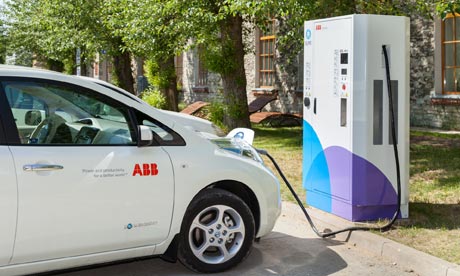Estonia launches national electric car charging network
165 charging points around the country will use direct current to charge cars in less than 30 minutes

The electric vehicle charging network in Estonia is operated by ABB. Photograph: Arno Mikkor
Estonia's reputation as one of the most wired-up countries in Europe has been boosted further with the opening of what is being billed as the world's first nationwide electric car charging network.
The sparsely populated Baltic state with a population of just 1.3 million hopes the 165 "fast chargers" will overcome the "chicken and egg" problem facing the take-up of electric cars worldwide.
The network of charging points, which was opened officially on Wednesday but has been running for several months, uses direct current (DC) to charge cars in less than 30 minutes, rather than around eight hours to recharge a car's battery as is the case with most of the more than 3,000 points in the UK.
There are believed to be around 650 electric cars in Estonia, more than 500 of which were Mitsubishi i-MiEVs given to social workers by the government in 2011. Motorists can get grants of up to€18,000 (£15,700) off electric cars, compared to the £5,000 cap for the UK's electric car grant. The average full price for a new electric car is around £30,000.
Estonia's minister of the environment, Keit Pentus-Rosimannus, said: "The fact that recharging is so easy is one of the main reasons more and more Estonians will decide in favour of electric cars in future. Our entire transport policy should be based on the notion that environmentally friendly travel is the cheapest and simplest option there is."
The charging points are no further than 60km apart, and were paid for by the Estonian government. Whether the push to electric cars will come with environmental benefits, however, remains to be seen: the former Soviet republic gets more than 90% of its electricity from carbon-heavy oil shale.
Ulrich Spiesshofer, head of discrete automation and motion at ABB, the Swiss company that makes the charging points and won the tender for the network in January 2012, said: "Having a nationwide fast-charging network will encourage motorists to switch to electric vehicles and it will motivate other countries to invest in their own charging infrastructure."
The distance electric cars can go between charges was the subject of heated debate in the US media in the last week, following a war of words between the New York Times and US electric car company Tesla Motorsover its new Model S car.
This week the UK government announced it would cover up to 75% of the cost of installing charging points for electric vehicles in garages and driveways.
No hay comentarios:
Publicar un comentario